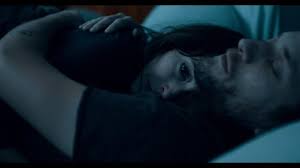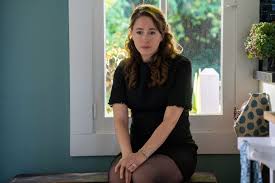By: Valerie Milano
Los Angeles, CA (The Hollywood Times) 9/22/24- The world of independent cinema is set to embrace a poignant narrative that delves into the intricate tapestry of familial relationships. ‘INHERITANCE,’ the highly anticipated movie directed by Emily Moss Wilson, is poised to captivate audiences with its raw emotional depth and nuanced storytelling. This female-driven drama promises to be a cinematic tour de force, exploring the complexities of sisterhood, buried secrets, and the quest for forgiveness.
 At the helm of this compelling project is a formidable team of creative forces. Emily Moss Wilson, whose previous works include ‘Drink,’ ‘Christmas in Tune,’ and ‘Rescuing Christmas,’ brings her directorial prowess to the fore. Collaborating with her is the talented Rachel Noll James, the writer behind ‘Ingress,’ ‘Don’t Pass Me By,’ and ‘The Storyteller,’ who has crafted a poignant and emotionally resonant script.
At the helm of this compelling project is a formidable team of creative forces. Emily Moss Wilson, whose previous works include ‘Drink,’ ‘Christmas in Tune,’ and ‘Rescuing Christmas,’ brings her directorial prowess to the fore. Collaborating with her is the talented Rachel Noll James, the writer behind ‘Ingress,’ ‘Don’t Pass Me By,’ and ‘The Storyteller,’ who has crafted a poignant and emotionally resonant script.
The film boasts an ensemble cast that promises to elevate the narrative to new heights. Austin Highsmith Garces, known for her remarkable performances in ‘Dolphin Tale 1 & 2,’ ‘Scream: The TV Series,’ and ‘Criminal Minds,’ takes on a pivotal role alongside Rachel Noll James herself. Their dynamic on-screen chemistry promises to captivate audiences, as they embody the complex dynamics of estranged sisters forced to confront their past.
 Supporting this talented duo are seasoned actresses Michelle Hurd and Cynthia Geary, whose presence adds depth and gravitas to the film. Rounding out the ensemble are Wes Brown, Chris Mulkey, and Brian McNamara, each bringing their unique talents to the screen.
Supporting this talented duo are seasoned actresses Michelle Hurd and Cynthia Geary, whose presence adds depth and gravitas to the film. Rounding out the ensemble are Wes Brown, Chris Mulkey, and Brian McNamara, each bringing their unique talents to the screen.
The road to bringing ‘INHERITANCE’ to life was paved with near-insurmountable challenges. Just weeks before production was set to commence on Bainbridge Island, WA, the team faced the largest industry work stoppage in over 60 years. Undeterred, Moss Wilson, Noll James, and Highsmith Garces secured an interim agreement from SAG-AFTRA, allowing the film to proceed.
“The strikes really put the spotlight on indie film and its importance to our industry,” remarked Emily Moss Wilson, reflecting on the obstacles they overcame.
 ‘INHERITANCE’ stands as a testament to the power of women supporting women, perseverance, and the indomitable spirit of independent filmmaking. Rachel Noll James and Sienna Beckman, co-founders of the female-focused production company Emergence Films, have brought their vision to life, marking the company’s second narrative feature.
‘INHERITANCE’ stands as a testament to the power of women supporting women, perseverance, and the indomitable spirit of independent filmmaking. Rachel Noll James and Sienna Beckman, co-founders of the female-focused production company Emergence Films, have brought their vision to life, marking the company’s second narrative feature.
“The timing of this production turned out to be a blessing, as it attracted a stellar supporting cast that enhanced the film’s depth and impact,” shared Rachel Noll James, highlighting the serendipitous nature of the project.
 At its core, ‘INHERITANCE’ follows the emotionally charged journey of two estranged sisters, Lucy and Paige, who reunite after the death of their father. As they navigate the complexities of their past, buried family secrets are unearthed, and unexpected paths to forgiveness emerge.
At its core, ‘INHERITANCE’ follows the emotionally charged journey of two estranged sisters, Lucy and Paige, who reunite after the death of their father. As they navigate the complexities of their past, buried family secrets are unearthed, and unexpected paths to forgiveness emerge.
The film promises to resonate with audiences on a profound level, exploring themes of resentment, trauma, loss, and the relentless pursuit of healing. Through the lens of these compelling characters, viewers will be invited to confront their own inner demons and reflect on the power of mending broken relationships.
 With a runtime of 102 minutes, ‘INHERITANCE’ promises to be an immersive cinematic experience. Moss Wilson’s directorial vision, coupled with Noll James’ poignant storytelling, will undoubtedly create a tapestry of emotion and artistry that will leave a lasting impression on audiences.
With a runtime of 102 minutes, ‘INHERITANCE’ promises to be an immersive cinematic experience. Moss Wilson’s directorial vision, coupled with Noll James’ poignant storytelling, will undoubtedly create a tapestry of emotion and artistry that will leave a lasting impression on audiences.
 This film is a testament to the enduring power of independent cinema, showcasing the ability of visionary storytellers to craft narratives that resonate with audiences on a profound level.
This film is a testament to the enduring power of independent cinema, showcasing the ability of visionary storytellers to craft narratives that resonate with audiences on a profound level.
The Hollywood Times had a chance to interview Emily Moss:
THT: “INHERITANCE” marks your directorial debut. What inspired you to choose this particular story as your first feature film, and what was your creative vision for it?
MOSS: INHERITANCE isn’t my directorial debut, but it is the first time I’ve directed an independent film, so I’ll answer from that vantage point…
INHERITANCE was a project that kind of chose me. Austin Highsmith Garces (who plays PAIGE) was the lead in the very first short film ever I directed called DRINK. We became close friends after that experience and were always looking for opportunities to work together. Austin and Rachel Noll James (who plays LUCY) were friends through an acting class and came up with the initial idea for this project together. They brought a first draft of the script to me very early on in the process. When I read it, a lot of the story resonated with me personally as a sister and as someone who has seen family inheritance complicate relationships. I wanted to direct this film because Rachel wrote a wonderful script that illustrated a unique sibling dynamic that isn’t often explored in film/tv, and I wanted to see Rachel and Austin step into those roles. My goal was to have the decisions and motivations of the characters resonate as truthful and believable even in heightened circumstances. I tried to capture through our cinematography and with the actors that were cast in the film.
THT: What were some of the initial challenges and opportunities you faced in bringing “INHERITANCE” from script to screen?
MOSS: The initial challenges on INHERITANCE mostly involved trying to get the project funded. For nearly 10 years we tried to pitch the project to production companies, getting close a few times, and even turning the film into a TV series at one point. At the time, our lead actresses, although talented, were not “star” names and I wasn’t a vetted director. But we never stopped believing in ourselves or this story. Once we did finally find funding, the SAG strike became another hurdle for us. We, thankfully, got a SAG Waiver at the 11th hour, but it really hindered how we could approach talent. Once we got to set, there were a few challenges associated with shooting on an island and having a small crew, but nothing that I hadn’t experienced before in one way or another.
THT: “INHERITANCE” features a female-driven narrative. How did your collaboration with screenwriter Rachel Noll James help in developing the characters and storyline?
MOSS: I became involved in helping to shape the story early in the process, not long after Rachel had finished a first draft. Rachel is an incredible writer and creative collaborator, and she welcomed my thoughts and ideas. She writes fast and she’s open to anything that makes the story better. I offered personal stories about my own family experience with inheritance which layered in nicely with the story that was already on the page. I also tried to help structurally by trimming fat where scenes were too long or making moments more efficient on screen and that continued during production.
THT: Can you describe any particular moments or aspects of the screenplay that stood out to you and influenced your directorial approach?
MOSS: I knew that we would need to know more about the backstory of these two sisters to help audiences understand the adult versions of them that we were seeing present day. I really liked the flashbacks in the script, and it was exciting to cast and shoot them, too. We wanted to structure the flashbacks like peeling an onion, layer by layer, so that each time the story went back to the past we learned or saw something new. I knew that I wanted to shoot the flashbacks organically and have something in present day trigger us (the audience) and the characters to go into them. For that reason, the transitions into the flashbacks aren’t overly stylistic and share the same “film language” as the rest of the movie. We kept the connection to the past emotional and used the characters seeing or hearing something in the present as the bridge.
THT: The performances of Austin Highsmith Garces and Rachel Noll James are central to the film’s impact. How did you work with them to bring the complex sister relationship to life?
MOSS: We had a lot of conversations about their backstory and their history together. We had to get down to the “why” behind a lot of their decisions and motivations and once that was clear to each of Rachel and Austin, it helped them understand Lucy and Paige better. We read through key scenes before we ever got to set and made sure the words felt real to each of them. After a while they would be quick to say “Paige would do that, but Lucy wouldn’t” or vice versa. And because both Rachel and Austin had lived with this script and these characters for the better part of 10 years as we tried to get the project made, I think a little bit of Lucy and Paige was just “in them.” When we started shooting, I just reminded them to keep everything honest and if I felt like anything was forced or unconnected we worked until we got there.
THT: What were some of the key aspects of the sister dynamic that you wanted to highlight in “INHERITANCE”?
MOSS: Lucy (the younger sister) has taken on somewhat of a caretaker role of Paige (the older sister) and has been in this position for most of her life, both unofficially and now officially. It was important for me to show how that burden of responsibility has affected Lucy at different points in her life. I also wanted to explore Lucy and Paige’s individual relationships with Luke, Lucy’s husband. Luke being Paige’s friend first, then meeting and falling for Lucy created this weird unspoken “love triangle” even though Luke and Paige didn’t have a romantic past. And finally, I wanted to highlight that even after immense hurt there can be healing on the other side.
THT: “INHERITANCE” explores themes related to family, inheritance, and sibling dynamics. How did you approach these themes to ensure they resonated deeply with the audience?
MOSS: Having a script that felt grounded and truthful was our foundation. Then, casting actors that felt real and honest and natural in their performances was the second ingredient to making sure that the story we were trying to tell would resonate with audiences. And finally, by drawing from our own experiences we were able to add specificity and depth to our story.
THT: The concept of inheritance can be both literal and metaphorical. How did you balance these interpretations in the film’s narrative and character development?
MOSS: In doing research for the film, we spoke to families who had been through a negative or messy experience with an inheritance. Most of them told us that the physical passing down of property, money, and possessions brought to light a lot of buried or unspoken issues that went much deeper within their respective families. With that in mind, we wanted to use Doug’s death and the passing down of something physical to be the thing that allowed for an exploration of the metaphysical “things” we’ve inherited from our parents. We used the physical inheritance as a way to crack open this family and expose secrets, regrets, and hardships so that there could ultimately be a path to forgiveness and healing.
THT: Can you describe your overall filmmaking approach, including the visual style, tone, and storytelling techniques you employed in “INHERITANCE”?
MOSS: I prioritize getting to know the script backwards and forwards so that by the time I’m shooting I’m not bound to a physical script or sides. This frees me up on set and allows me to fully engage with what’s happening right in front of me. Deeply knowing the script (both structure and dialogue) is also a huge asset in the edit. Seeing the structure in my head allows me to play with moving moments around in post, but also restructuring or adapting on set if something arises or an actor has a new idea or instinct.
In terms of style and tone, I knew that I wanted the camera to feel like it was part of the story, being able to move around with the actors. When I met and spoke with my DP, Dan Clarke, he agreed that he wanted to shoot most of the film handheld for that very reason – intimacy with the characters. We tried to keep everything very naturalistic and real. We felt like too many stylized or “fancy” shots could take people out of the movie. We tried to make sure that any camera movement felt motivated by the actor or their performance.
THT: As an indie director, resourcefulness is often key. How did you manage the practical challenges of making “INHERITANCE” and what creative solutions did you find?
MOSS: Challenges are an expected part of filmmaking, and I think one of the keys to navigating them successfully is hiring well. As an indie film, we had a small but mighty crew with varying levels of experience. Sometimes those gaps were evident, but in the end any weaknesses were overshadowed by the grit of the team as a whole. Another challenge we faced was getting the main house in the film (which is a bit of a character itself) ready for filming. The property had great bones, but it wasn’t “camera ready.” Our production design team had to really get creative with how to elevate the look and feel of the house without breaking the bank. They used a lot of thoughtful design techniques, including building facades or putting up temporary design elements, that transformed the house into a warm, lived in space. We had a smart line producer who helped us manage what little financial resources we did have to make sure that we were staying on time and on budget. And of course, we had to get creative with shots and scenes when we had a few bad weather delays. That’s a normal part of filmmaking. Everyone was game for reworking scenes to make sure that even with scheduling setbacks we were able to tell the story to the fullest.






